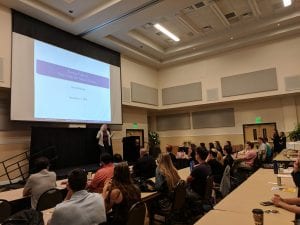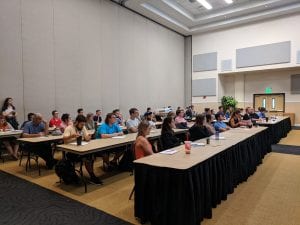Terrorism expert sheds light on motivations of Islamist Militants

Dr. Mironova speaking in the Cape Florida Ballroom. Courtesy of Renzo Pierres.
By Renzo Pierres
Why would a person leave their country to fight in a foreign conflict? And how do they decide to join a specific group?
On Thursday, Sept. 6, 2018, Vera Mironova, Ph.D., shared her research and fieldwork in conflict zones to help answer these questions. Her discussion, “Everything You Wanted to Know About Islamist Foreign Fighters (But Were Afraid to Ask),” took place in the Cape Florida Ballroom for an audience of about 50 people.
Mironova is a visiting scholar in the Economics Department of Harvard University. She is a widely published author and has been featured in the Journal of Conflict Resolution, the British Journal of Political Science and Foreign Affairs. Mironova researches foreign fighters’ attitudes and what affects an individual’s decision to join overseas conflicts, especially in groups like Islamic State and Tahrar al-Sham.
To illustrate the broad pull of an organization like ISIS, Mironova began her discussion with a cynical quip that the only country that has not sent fighters to Syria is probably the Vatican. She continued that people leave to fight for both positive and negative reasons. Some positive reasons are an individual wanting to accomplish something by leaving their country, such as undergoing training, earning money, gaining status and finding meaning to their lives. Some negative reasons include wanting to prevent something from happening, such as escaping discrimination or avoiding prison. She explained that some are Turks fighting overseas who are “escaping prosecution for pedophilia,” while others are Chechens fleeing persecution for homosexuality. Mironova also found that the reasons people choose to leave their homes often influence how committed they are to the cause.
The second question, how people choose the group to join, also has many deciding factors. Some include personal and family safety, material benefits, and both the internal organization and prestige of the militant group. Groups have differing goals, organizational structures and levels of compensation for fighters. These variables not only explain the draw they have for recruits, but can also represent why people leave certain groups as well. Better understanding about how people decide to leave and fight for a certain group can improve efforts to influence this behavior.

The audience listening to Dr. Mironova’s research. Courtesy of Renzo Pierres.
Mironova took questions from the audience after her lecture. One person voiced his confusion about how Americans, born and raised here, could leave their country and fight overseas for a group like ISIS. Mironova answered that nationality has little to do with an individual’s decision to go overseas, and reiterated that the reasons were often personal and complex.
Mironova’s event was hosted by the UCF Intelligence Community Center for Academic Excellence, with support from the UCF Global Perspectives Office. Visit their websites for information about upcoming events and student opportunities.
